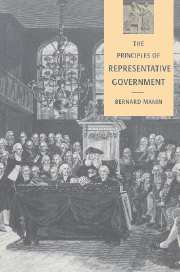Book contents
1 - Direct democracy and representation: selection of officials in Athens
Published online by Cambridge University Press: 08 March 2010
Summary
Representative government gives no institutional role to the assembled people. That is what most obviously distinguishes it from the democracy of the ancient city-states. However, an analysis of the Athenian regime, the best-known example of classical democracy, shows that a further feature (one less often commented on) also separates representative democracy from so-called direct democracy. In the Athenian democracy, many important powers were not in the hands of the assembled people. Certain functions were performed by elected magistrates. But what is particularly remarkable is that most of the tasks not done by the Assembly were entrusted to citizens selected by a drawing of lots. By contrast, none of the representative governments set up in the last two centuries has ever used lot to assign even one modicum of political power, whether sovereign or executive, central or local. Representation has only been associated with the system of election, sometimes in combination with heredity (as in constitutional monarchies), but never with lot. So consistent and universal a phenomenon ought to invite attention and indeed scrutiny.
It cannot be accounted for, as can the absence of the popular assembly, by material constraints alone. To explain why representative governments grant no role to the assembly of citizens, authors usually talk about the size of modern states. It is simply not possible, in political entities so much larger and more populous than the city states of Antiquity, to bring all the citizens together in one place to deliberate and make decisions as a body. Inevitably, therefore, the function of government is performed by a number of individuals smaller than the totality of citizens.
Information
- Type
- Chapter
- Information
- The Principles of Representative Government , pp. 8 - 41Publisher: Cambridge University PressPrint publication year: 1997
Accessibility standard: Unknown
Why this information is here
This section outlines the accessibility features of this content - including support for screen readers, full keyboard navigation and high-contrast display options. This may not be relevant for you.Accessibility Information
- 2
- Cited by
